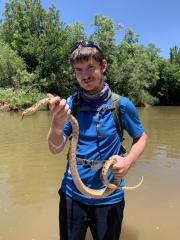
Biology student Kasey Jobe will represent Stephen F. Austin State University at the 2021 Texas Undergraduate Research Day held virtually at the state Capitol Feb. 23 and 24. His work is one of only 100 research projects from across the state selected to participate and focuses on how installation methods affect snake entanglement in erosion control blankets commonly used in transportation and construction projects.
Jobe, pursuing a Bachelor of Science in biology with a minor in forestry, worked with Dr. Christopher Schalk, assistant professor of forest wildlife management at SFA’s Arthur Temple College of Forestry and Agriculture, to investigate how installation methods affect snake entanglement in erosion control blankets.
His work is one of only 100 research projects from across the state selected to participate.
“Erosion control blankets are installed at construction sites to mitigate against soil loss and promote plant growth,” Jobe said.
Previous research conducted by Jobe found that particular types of erosion control blankets — small‐diameter polypropylene mesh with fixed intersections and multiple-layers — are more likely to cause wildlife entanglement, especially among snakes.
With this knowledge, Jobe and his collaborators moved forward to determine if the installation method of these blankets could reduce instances of entanglement and subsequent mortality.
They found that burying the edges of the installed erosion control blankets led to a significant decline in snake entanglement.
“No snakes became entangled in the buried edge treatment, supporting our hypothesis that modifying the installation technique for erosion control blankets is effective at reducing behavior that leads to entanglement,” Jobe said. “An exposed edge increased the number of attempts, which is a precursor to entanglement.”
Jobe is a co-author on three peer-reviewed scientific papers focused on snake entanglement research conducted at SFA.
“Involving undergraduates in research is a rewarding process, as they are involved in every step in the scientific method and experience the challenges of designing and addressing questions in science,” Schalk said. “It also allows students to see that we as faculty members do not have the answers ahead of time, but we are interpreting these results together.”
Funding for this project was provided by the Texas Department of Transportation, the state agency responsible for numerous large and complex transportation projects that require the use of erosion control mats. The research findings were presented to the agency.
Texas Undergraduate Research Day, coordinated by the Council of Public University Presidents and Chancellors and the Independent Colleges and Universities of Texas, Inc., showcases the experiences of undergraduate students engaged in research that positively impacts Texas and Texans.
Jobe’s work will be showcased for Texas legislators and the public through high-quality virtual poster presentations available at cpupc.org/ugrd/.
Story by Sarah Fuller, outreach coordinator for Stephen F. Austin State University’s Arthur Temple College of Forestry and Agriculture. Contact information: (936) 468-1185 or fullersa@sfasu.edu



